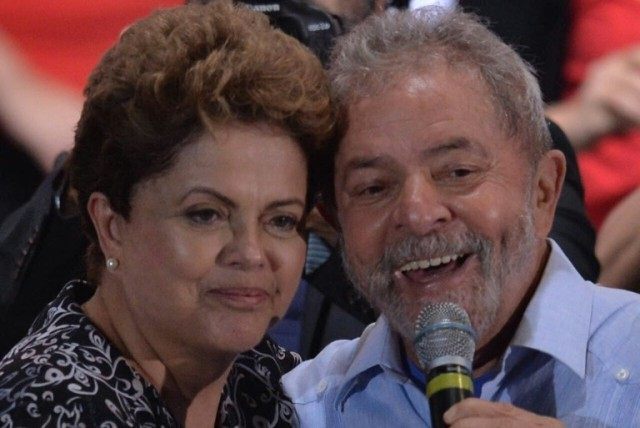Brasília (AFP) – Brazilian President Dilma Rousseff named her predecessor Luiz Inacio Lula da Silva as her chief of staff Wednesday, sparing him possible arrest for corruption as she seeks to fend off a damaging crisis.
The two leftists who have led Brazil for the past 13 years are both fighting for their political survival, and news they were teaming up again in the government deeply divided Brazil even before it was officially announced.
Allies call Lula the only man capable of saving the embattled government, but opponents condemn the fact that ministerial immunity will now protect him from prosecution in ordinary court.
Cabinet ministers can only be tried before the Supreme Court in Brazil.
The appointment is a risky bet for Rousseff, who is battling crises on multiple fronts: an impeachment attempt, a deep recession, mass protests and the fallout of an explosive corruption scandal at state oil giant Petrobras.
Lula was hugely popular when he stepped down five years ago at the height of an economic boom, but he returns to Brasilia with heavy baggage: he has himself been charged with money laundering in a case linked to the Petrobras scandal.
The opposition was quick to slam the appointment.
“Instead of explaining himself and assuming his responsibilities, former president Lula preferred to flee out the back door,” said lawmaker Antonio Imbassahy, lower house leader for opposition party PMDB.
“It’s a confession of guilt and a slap to society. President Dilma, by appointing him, has become his accomplice,” Imbassahy added. “The final chapter in this story will be her impeachment.”
Lula, 70, left office with 80 percent popularity ratings and the status of a hero to the left.
During his two terms, he presided over a watershed period of prosperity and social programs that helped lift tens of millions of Brazilians from poverty.
But his legacy is now threatened by charges that he accepted a luxury apartment as a bribe from a company implicated in the Petrobras scandal.
At a deeper level, he faces suspicions among many Brazilians that his entire administration was underpinned by graft.
Lula vigorously denies the accusations.
– Impeachment case looms again –
His problems may not stop there, however: prosecutors have indicated they are investigating whether he played a more central role in the multibillion-dollar corruption scheme at the state oil giant.
Investigators say construction companies conspired with Petrobras executives to overbill the oil giant to the tune of $2 billion, some of which was paid out as bribes to politicians and parties.
Rousseff chaired Petrobras during much of the period in question, but does not face charges so far.
The anti-corruption probe now appears to have the president squarely in its sights, though.
In a plea deal published Tuesday, a senator arrested in the case accused Rousseff of trying to buy his silence.
The senator, Delcidio Amaral of the ruling Workers’ Party (PT), told investigators that Education Minister Aloizio Mercadante, Rousseff’s former chief of staff, contacted him via an aide to urge him not to testify.
Amaral, the former party leader in the Senate, handed over recordings of the conversations to investigators. He said the minister indicated he had been sent by Rousseff herself — an accusation the leftist leader angrily denied.
Prosecutors have used plea bargains throughout the investigation to implicate a steadily expanding Who’s Who politicians and business executives in the spiraling scandal.
The impeachment push against Rousseff is not directly related to the corruption scandal, but has advanced in tandem with it, deepening the crisis engulfing her administration.
The Supreme Court convened Wednesday to rule on the procedures for an impeachment to go forward.
Rousseff’s enemies in Congress launched the impeachment bid last year, but the high court halted it over procedural issues.
The president is accused of illegally manipulating the government’s accounts to boost public spending during her 2014 re-election campaign.
On Sunday, an estimated three million Brazilians flooded the streets in nationwide protests calling for Rousseff’s departure.
The president, whose government has already ground to a virtual halt over the crisis, also risks being ditched by a key party in her coalition, the centrist PMDB, the largest party in Brazil.

COMMENTS
Please let us know if you're having issues with commenting.